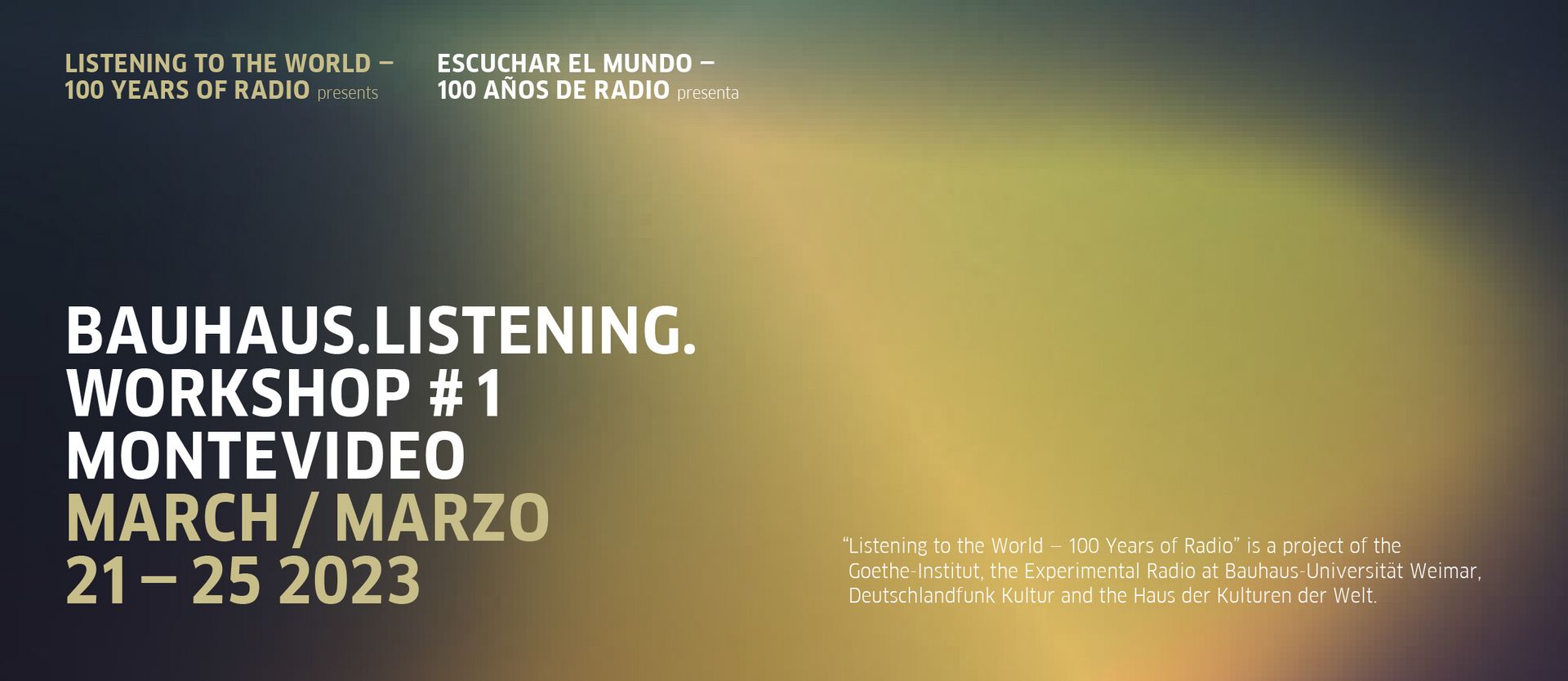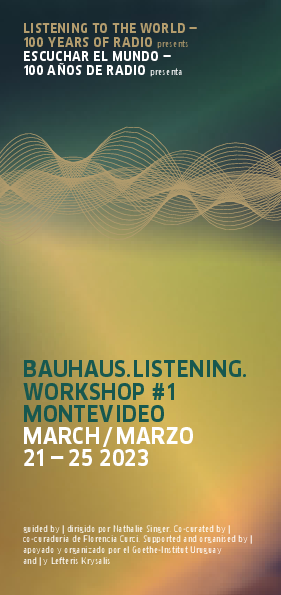How has radio shaped our listening over the last 100 years? What practices and methods of listening have different cultures developed? How does radio relate to power structures and colonial history? What contribution could a culture of listening make in the future in an increasingly globalized and at the same time polarized world?
From Bolivia in 1897 and the first established telecommunications to today's community radios of the vibrant Latin American scene, radio reveals configurations of power and resistance. This allows us to trace narratives in the political, social and cultural development process of the region. This project aims to create a space that allows participants from different places to share their experiences, challenges and tools for collaborative governance. We want to address the question of responsibility for the cultural technology of listening and develop new models for the acoustic media of the future.
In the Bauhaus.listening.workshop, we will observe our own habits of perception in an artistic-performative process, test methods of listening and tell our own radio stories. We will explore the potential for innovation that emerges from the cultural heritage of local radio landscapes and their (post)colonial history. In the end, we want to address the question of the responsibility of the cultural technique of listening in a changing globalized, mobile and cosmopolitan society and develop new models for acoustic media of the future.
Participants
Luis Alvarado Buh Records, Perú
Estefania Barnetche Colectivo Basura, Uruguay
August Black University of Colorado, Estados Unidos
Alejandra Carro Colectivo basura, Uruguay
Fátima González Donado Amazondas, Perú *
Alejo Duque HK4ADJ, CK:\WEB & radiolibre.cc, Colombia
Zezé Fassmor ZZ no TV, Perú-Argentina
Fernando Godoy Radio Tsonami, Chile
Lukas Kühne Director del Instituto de Música Facultad de Artes —UdelaR, Uruguay
Guely Morató Sonandes, Bolivia
Gabriela Munguía Electrobiota, Argentina
Federíco Musso Uruguay
Organización De Mujeres Originarias Aretede Y Radio La Voz Indigena Argentina *
Rodrigo Ríos Zunino Radio Tsonami, Chile
Luciana Rizzo Radio CASo Argentina
Lourdes Silva Uruguay
María Juliana Sotto Universidad Icesi, Noís Radio y Mutó, la radio, Colombia
Ana Laura López de la Torre Uruguay
Stephanie Lòpez Noís Radio y Mutó la radio, Colombia
Alfredo Thiermann EPFL Lausanne, Chile *
Pol Villasuso Uruguay
*Online-Teilnehmer*Innen
Nathalie Singer is professor for Experimental Radio at the Bauhaus-Universität Weimar. She worked as radio artist and producer, composed for various media, publishes on the topic of sound art. She was dramaturge in the radio play department of Deutschlandradio Kultur, where she developed new radio play formats (Wurfsendung). Her artistic research focuses on the development of radio art archives and their artistic mediation (traveling exhibition Radiophonic Spaces). Currently she created the Bauhaus.Listening.Workshop and is particularly interested in the cultural technique of listening and its potential in shaping new environments.
Florencia Curci works as a sound and radio artist, performer, curator, and cultural manager. Curci is the director of CASo (Sound Art Center), an institution of the Ministry of Culture of Argentina promoting artistic research on sound, radio art, experimental music and listening studies. Curcis work was commissioned by KunstRadio, AMEE, CA2M, Centro Cultural Kirchner and her live performances were presented in Festival Aural, MediaLab Prado, Tsonami Sound Art Festival among others.
Lefteris Krysalis is a radio and sound artist as well as a freelance researcher. He completed his bachelor’s degree in Art History and Theory at the Athens School of Fine Arts and his M.F.A in Media Arts and Design at the Bauhaus University Weimar in the chairs of Experimental Radio and Studio of Electroacoustic Music. He was a DAAD scholarship holder and guest teacher at the Bauhaus University Weimar. Currently he is artistic associate in the Experimental Radio and the project coordinator of the Radio Art Residency Weimar.
Goethe-Institut Uruguay: Christiane Schulte (Institute Director) and Irene Müller (Programme Coordinator) have been working on the topic of radio art since 2020 - a real discovery! With their initiatives, they work to create more space and attention for artistic production and reflection of radio art: on a local, regional and European level.
The Bauhaus.Listening.Workshop is part of the SENSE.LAB at the Bauhaus University Weimar. The Institute for Perceptual Skills and Consciousness Formation was launched in connection with the New European Bauhaus in order to help shape the change and transformation of our society in an aesthetic, integrative and sustainable way.
The Goethe-Institut Uruguay promotes knowledge of the German language abroad and fosters international cultural cooperation.
About the project
»Listening to the World – 100 Years of Radio« is a collaborative project between the Goethe-Institut, the Department of »Experimental Radio« at the Faculty of Art and Design at the Bauhaus-Universität Weimar, Deutschlandfunk Kultur and the »Haus der Kulturen der Welt«.
It is funded by the Goethe-Institut as well as the »New European Bauhaus« project at the Bauhaus-Universität Weimar. The development of the »Transcultural Listening Map« is funded by the Bauhaus-Universität Weimar’s Kreativfonds.
Responsible:
Led by:
Nathalie Singer
Co-curated by:
Florencia Gurci
Supported and organised by:
Goethe-Institut Uruguay und Lefteris Krysalis.
Location:
Goethe-Institut Uruguay
Christiane Schulte and Irene Mueller
Santiago de Chile 874
11200-Montevideo, Uruguay
Every region of the world has its own stories of listening and unlistening, of gathering and dividing communities around the radio. But because radio waves do not stop at national borders, these stories are interconnected in many ways. The project would like to explore the regional differences in the four-part series of events the Bauhaus.Listening.Workshops on different continents: in South America, Southeast Asia and Southern Africa, among others, artists, researchers, media professionals and listeners from the respective regions will address various questions about listening as a cultural technique in its diversity and its transcultural interconnections.


